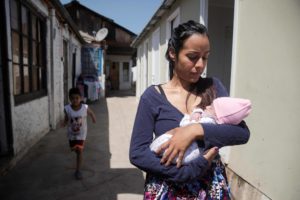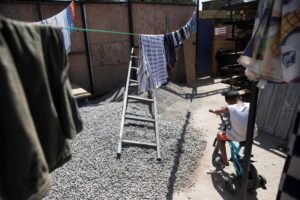Santiago, Feb 25 (EFE).- In 2015, evangelical Pastor Bernabe Bazan began welcoming Venezuelan migrants into his church at Puente Alto, a poor neighborhood in Santiago.
Three-and-a-half years later, the church has become a shelter that offers lodging, food and hope to more than 80 Venezuelans at a time, and where some 400 migrants have stayed after fleeing the crisis in their country.
The Venezuelans who come to the door of Bernabe’s shelter are refugees with virtually nothing left to their name – women, men and children who left Venezuela on foot or on the highway with their few belongings, and who slept in city squares and bus terminals across the South American continent.

The pastor told EFE that many Venezuelans who have come to his refuge are professionals: doctors, engineers, journalists, lawyers and publicists who in Chile accept whatever work they can find in order to send money home to their families.
“I realize the magnitude of Venezuela’s crisis when I see these people here. But they seem to have the spirit to regroup and start over,” he said.
The crisis has spurred an explosive growth in the number of Venezuelans arriving in Chile, where they have become the principal immigrant community with more than 288,000 arrivals, 23 percent of all foreign migrants.
That is easily discerned at the Puente Alto shelter. Every day the pastor gets a dozen messages from Venezuelans wanting to stay at the shelter.
Despite the fact that it operates at full capacity and depends totally on donations, Bernabe Bazan said he personally finds it impossible to turn away families that show up at the shelter with small children.
By mid-morning of a weekday there are few people in the refuge. Most are at work or looking for a job, one of the few conditions the pastor imposes.
The shelter is located on a long, narrow stretch of land. On one side are the rooms that the refugees themselves have been building with all kinds of materials as their number has grown.
There are bathrooms, a kitchen with a refrigerator and two gas-ranges, while the large area inside the church has been reduced by half to provide more space for bedrooms.
Paulina Lereico, 22, came into that enclosed area of the church carrying her daughter Elizabeth, born two weeks ago. She arrived in Chile in March of last year with her mother and two brothers from Caracas.
“The Venezuelan economy is devastated. My brothers and I were studying at the university but the professors were all leaving, no one was giving us classes, so we decided to leave the country. And anyway, we had nothing to live on from one day to the next,” she told EFE.
She believes the Nicolas Maduro regime will soon fall – “those of us who want a change are in the majority and that’s going to happen” – and hopes to return to Venezuela when the situation improves.
Running around the refuge were little 7-year-old Diego and Numa, 5, the children of Daniel Garces, who looks after the kids while his wife works at a retirement home.

The four came to the refuge three weeks ago after a 22-day odyssey through Colombia, Ecuador and Peru. For much of their journey they hitched free rides on trucks, but there were also long, grueling hikes.
They said they were driven out of Venezuela by the boundless inflation and scarcity of food. “A month’s wages was only enough to buy a kilo (a little over 2 lbs.) of rice and three eggs. Who can eat for a month with that?” Garces said.
One of the people who helped most to maintain order and keep the shelter clean was Ibis Rodriguez, 53, who came here from Puerto Ordaz, Venezuela, four months ago.
With her was her daughter, an attorney by profession, her son-in-law and two of her grandchildren, an impoverished middle-class family forced to pack their bags and try their luck in another land.
“The situation in Venezuela pushed us out. Venezuela has never been a country of emigrants, so for us this was something very different, very new and hard to take,” Ibis said.
Those staying at the shelter are of different ages, tell different stories and come from all over Venezuela, but all share feelings of infinite gratitude toward Pastor Bernabe Bazan and to Chile, a country which, they said, received them with open arms.
The pastor, who now speaks with an unmistakable Venezuelan accent, admits he was captivated by the courtesy and friendliness of these migrants, and is moved to think that when Venezuela “is free,” many of his lodgers will return to their homeland.
“Every day I think that when their government falls, many will return home. And I’m happy because they have to go back, but I don’t know what it will be like when the Venezuelan people aren’t here any more,” he said.
